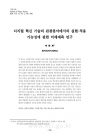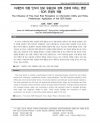제목: THE RED FLAG OF EMERGENCY USE AUTHORIZATION (EUA) Institutional Conflict Resulting in Different COVID-19 Testing Outcomes Comparing the United States and South Korea
요약:
The Emergency Use Authorization (EUA) policy, a representative biodefense policy, was legislated in the United States in 2001 based on lessons learned from Amerithrax, whereas Korea’s EUA policy was based on lessons learned from the Middle East Respiratory Syndrome outbreak in 2015. Due to these divergent origins, the U.S. EUA’s homeland security objectives were specialized to deal with highly pathogenic biological agents that could be exploited for bioterrorism, whereas the Korean EUA pursues disease containment purposes to strengthen mass-testing practices. During the early phase of the COVID-19 pandemic, the U.S. EUA revealed limitations in its integration with public health surveillance, laboratory partnerships, and insurance systems, which hampered the rapid expansion of testing capacities. Thereafter, once the limitations of the EUA were circumvented, the testing capacity of the United States began to catch up with that of South Korea, and later skyrocketed after solving these issues.
주제어: COVID-19, Pandemic, United States, Emergency Use Authorization, Homeland Security, Institutional Conflict, Public Health Surveillance, South Korea, Biodefense, Diagnosis.
출처: Kim, H. (2023). THE RED FLAG OF EMERGENCY USE AUTHORIZATION (EUA) Institutional Conflict Resulting in Different COVID-19 Testing Outcomes Comparing the United States and South Korea. World Affairs, 186(3), 627-655.





